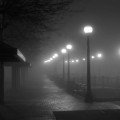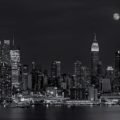 “The other ambassadors warn me of famines, extortions, conspiracies, or else they inform me of newly discovered turquoise mines, advantageous prices in marten furs, suggestions for supplying damascened blades. And you?” the Great Khan asked Polo, “you return from lands equally distant and you can tell me only the thoughts that come to a man who sits on his doorstep at evening to enjoy the cool air. What is the use, then, of all your traveling?”
“The other ambassadors warn me of famines, extortions, conspiracies, or else they inform me of newly discovered turquoise mines, advantageous prices in marten furs, suggestions for supplying damascened blades. And you?” the Great Khan asked Polo, “you return from lands equally distant and you can tell me only the thoughts that come to a man who sits on his doorstep at evening to enjoy the cool air. What is the use, then, of all your traveling?”
“It is evening. We are seated on the steps of your palace. There is a slight breeze,” Marco Polo answered. “Whatever country my words may evoke around you, you will see it from such a vantage point, even if instead of the palace there is a village on pilings and the breeze carries the stench of a muddy estuary.”
“My gaze is that of a man meditating, lost in thought — I admit it. But yours? You cross archipelagoes, tundras, mountain ranges. You would do as well never moving from here.”
The Venetian knew that when Kublai became vexed with him, the emperor wanted to follow more clearly a private train of thought; so Marco’s answers and objections took their place in a discourse already proceeding on its own, in the Great Khan’s head. That is to say, between the two of them it did not matter whether questions and solutions were uttered aloud or whether each of the two went on pondering in silence. In fact, they were silent, their eyes half-closed, reclining on cushions, swaying in hammocks, smoking long amber pipes. Marco Polo imagined answering (or Kublai Khan imagined his answer) that the more one was lost in unfamiliar quarters of distant cities, the more one understood the other cities he had crossed to arrive there; and he retraced the stages of his journeys, and he came to know the port from which he had set sail, and the familiar places of his youth, and the surroundings of home, and a little square of Venice where he gamboled as a child. At this point Kublai Khan interrupted him or imagined interrupting him, or Marco Polo imagined himself interrupted, with a question such as: “You advance always with your head turned back?” or “Is what you see always behind you?” or rather, “Does your journey take place only in the past?”
All this so that Marco Polo could explain or imagine explaining or be imagined explaining or succeed finally in explaining to himself that what he sought was always something lying ahead, and even if it was a matter of the past it was a past that changed gradually as he advanced on his journey, because the traveler’s past changes according to the route he has followed: not the immediate past, that is, to which each day that goes by adds a day, but the more remote past. Arriving at each new city, the traveler finds again a past of his that he did not know he had: the foreignness of what you no longer are or no longer possess lies in wait for you in foreign, unpossessed places.
Marco enters a city; he sees someone in a square living a life or an instant that could be his; he could now be in that man’s place, if he had stopped in time, long ago; or if, long ago, at a crossroads, instead of taking one road he had taken the opposite one, and after long wandering he had come to be in the place of that man in that square. By now, from that real or hypothetical past of his, he is excluded; he cannot stop; he must go on to another city, where another of his pasts awaits him, or something perhaps that had been a possible future of his and is now someone else’s present. Futures not achieved are only branches of the past: dead branches.
“Journeys to relive your past?” was the Khan’s question at this point, a question which could also have been formulated: “Journeys to recover your future?”
And Marco’s answer was: “Elsewhere is a negative mirror. The traveler recognizes the little that is his, discovering the much he has not had and will never have.”







